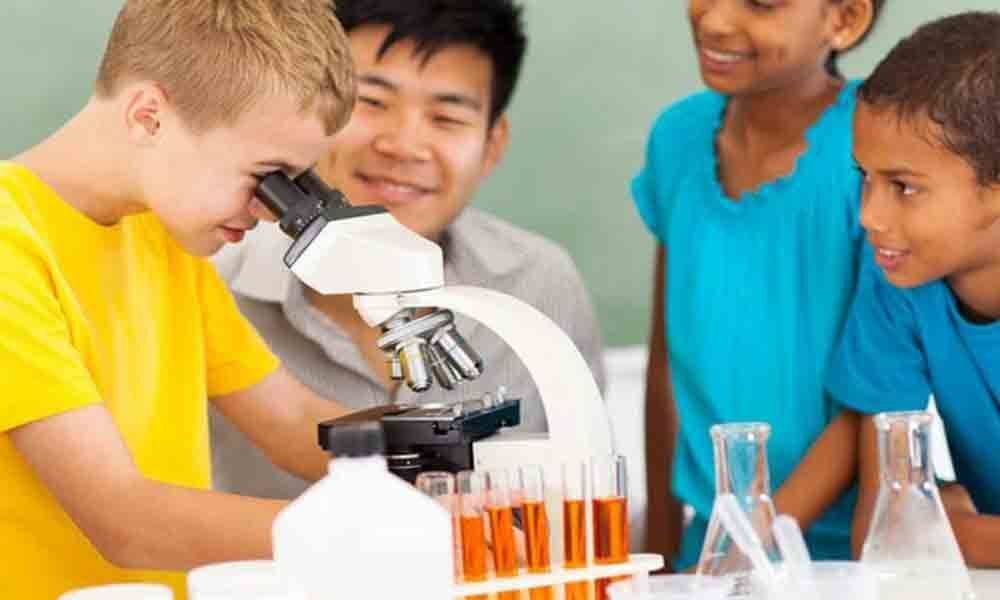Just In
Tips for teaching science to elementary students


Students who are 8-12 years of age are becoming more relational and enjoy group activities. At about age 10 they begin making decisions on their own and are thinking more abstractly. They move from thinking concretely and literally to be able to think more creatively or abstractly.
Students who are 8-12 years of age are becoming more relational and enjoy group activities. At about age 10 they begin making decisions on their own and are thinking more abstractly. They move from thinking concretely and literally to being able to think more creatively or abstractly.
Children at this age may become less secure due to bodily changes, and the need to be correct becomes even stronger. This age group tends to believe they are right and like justice to be carried out on the "wrong-doers." They have the tendency to be impatient, anxious, and easily discouraged. However, they are also joyful, enthusiastic, and positive.
Use the following guideline for teaching science to grades 3-5 and achieving a positive learning experience.
1. Utilize developing math skills and problem-solving. Math skills are increasing at this age and students can measure accurately and begin problem-solving. Provide opportunities for students to measure a variety of materials, both liquid and dry ingredients, using metric and standard measurements. Allowing this age group opportunities to solve problems on their own or in a group setting encourages independent thinking. An example is letting students set up a recycling center on their own.
2. Engage students by asking questions. Critical thinking skills are part of brain maturation of this age group and need to be encouraged and stimulated. Forming a hypothesis by predicting what will happen in an experiment provides an ideal opportunity to foster critical thinking. Help them along by asking questions, such as: What will happen next? Why did that happen? Do you know the name for that? Thinking through their answers pushes kids to order their thoughts and helps them begin to see how the world works.
3. Build confidence through participation. Students in this age group understand the world around them somewhat and often become anxious about the future. They crave confidence in their work and are usually eager and desire involvement. Let them participate in or help set up experiments. If possible, allow them to assist younger students. All these activities instill confidence in themselves and their developing science skills, which will increase as they participate and understand more.
4. Move from concrete to abstract concepts. The 8-12 year olds are moving toward thinking logically and abstractly. They are able to deal with multiple variables, such as increased numbers and adding several chemicals to an experiment. These parts of thinking aid in understanding science better. Experiments and concepts for this age should have more detail than the early elementary grades. An example is learning about changing colors in leaves. In the earlier grades, students might collect, sort, and observe leaves. But by third grade, students can perform an experiment to determine why leaves change colors.
5. Alleviate boredom through activity. This age group may become easily frustrated and impatient while waiting for a part of an experiment. During waits, they'll do best to have short spans of intense work. Examples of this are utilizing a science notebook or setting up the next step of an experiment. They can also collect specimens such as rocks, insects, and plants. Students may also benefit from reading interesting books on the science topic they're studying.
6. Encourage skills through a science notebook. Students develop their increasing written communication abilities by using a science notebook. It's a permanent place to record thoughts, data, and drawings about observations and experiments, as well as results based on experiences. Using a science notebook also strengthens students' grasp of the scientific method as they record each step of an experiment while it's performed.
7. Encourage independent investigation. This age group is naturally curious and interested in the investigation. Provide them with science tools, such as a magnifying glass, magnets, and beakers. Also provide access to safe household items, like Alka-Seltzer, vinegar, and baking soda. Offer supervision and guidance, but allow students to experiment independently. They are able to make their own discoveries using their science supplies. Seeing results in action helps kids develop critical thinking and science skills.
8. Develop the mind further through vocabulary. Recording vocabulary words in a science notebook provides a reference for future use. Vocabulary words are essential for grasping foundational science concepts and deepening comprehension. Learning vocabulary words also increases students' ability to think, reason, draw conclusions, and communicate effectively.
9. Tell students they are scientists. Through observation and experimentation, students are performing "real science." Students in third through fifth grade understand the importance of science in society. Ask them what areas of science interest them. Then, provide as much opportunity as possible for them to independently pursue it. Fostering a love for science helps students encounter the world at a deeper level. It may even set a course for future science careers.

© 2024 Hyderabad Media House Limited/The Hans India. All rights reserved. Powered by hocalwire.com






